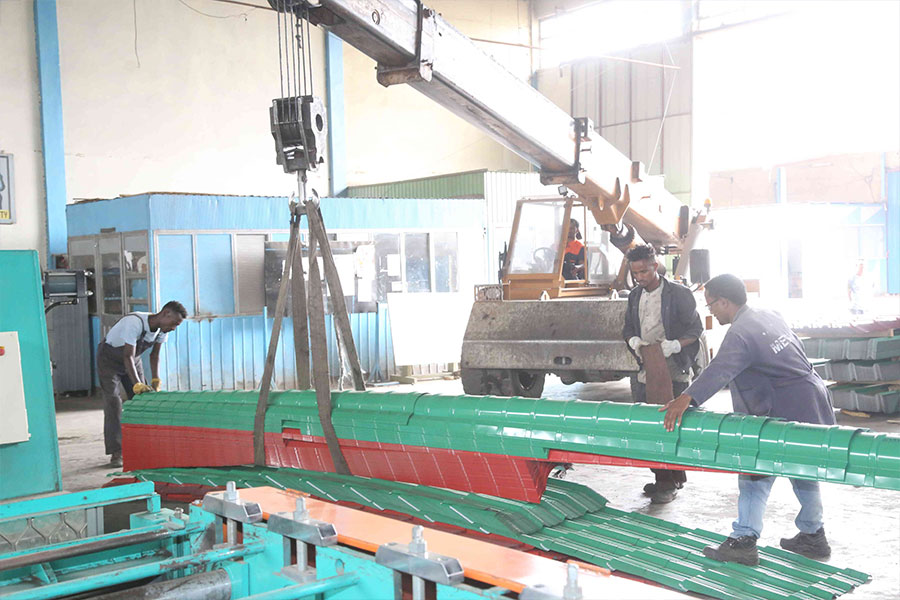
Radar | Jul 21,2024
Winta Ta'ime, 28, has been waiting for the opportunity to break into Addis Abeba's blossoming cosmetics industry. She has worked as a technician in a nail salon for over four years. Her job and raising two children kept her from enrolling at one of the many makeup schools popping up across the capital.
Winta decided to quit her job three months ago and took one step towards her dream of opening a makeup studio. She enrolled at Jordan Beauty School, which opened in the middle of this year in the Megenagna neighbourhood, not far from her residence. Winta and three students signed up for the month-long course, hoping to acquire the know-how necessary to make a mark in the thriving industry.
Says Winta: "Makeup is becoming a household item."
Five years ago, makeup was only a tiny part of the country's beauty industry. It mainly consisted of hair and nail salons. What little of a market there existed for makeup, for the most part, was within these salons. However, the scene has transformed quite rapidly.
Primarily driven by the proliferation of social media and improved internet access, the makeup industry has seen a staggering boom. The increase in the number of Instagram users has helped market players thrive. The role of influencers such as Danayit Mekbib (a TV personality) and Hanan Tarq, is undeniably high. With the power to change the face of the beauty industry, they easily capture the attention of users with photos and videos while being assisted by the vanishing of traditional forms of marketing in TV commercials and magazine ads.
The increased interest in makeup products among consumers has encouraged people like Winta to get involved in the blossoming market.
The phenomenon is not particular to Ethiopia. The makeup business is exploding worldwide. The industry has been growing at a rate of 4.5pc annually for the past decade. Despite a dip in 2020 due to COVID-19, it is estimated to be worth a whopping 230 billion dollars, according to data from L'Oreal, the world's leading cosmetics company. Nonetheless, Africa makes up less than three percent of the global market, and the industry's growth became apparent in Ethiopia only in recent years.
First came the cosmetics shops and stalls selling high-quality products imported from the Middle East or China. The studios followed. Women were happy to pay tens of thousands of Birr for a makeover and the industry found a loyal customer base in those celebrating a special occasion, particularly weddings.
The growing interest in makeup and increased business brought overseas companies such as MAC Cosmetics to Ethiopia. The New York based brand, under the multinational beauty giant Estee Lauder, opened its doors in the capital under a franchise agreement with NHY Import & Export, a company involved in retail, hospitality and duty-free shops. Nur Hussien, a close friend of Mohammed Ali Al-Amoudi, formed the company in the early 1990s and was involved in the hospitality industry, running establishments such as London Cafe and Monaco Bar.
Its involvement in the beauty industry is more recent, opening a store on Namibia Street, near Edna Mall in late 2019. Buyers pay thousands of Birr for small containers of products like concealer and eyeliner.
MAC was joined by dozens of retailers that sell similar products. And others in the industry moved to take advantage of the lucrative market by opening makeup schools.
The first to do so was Dereje Fikre. He returned to Ethiopia seven years ago from a stint abroad working as a makeup artist. He lived and practised this in Nigeria and Djibouti for four years before moving back to Addis. He had also enrolled in beauty courses at Real Campus by L'Oreal in Paris. In 2017, he opened Sippara Makeup School in Blen Building on Djibouti Street, in the Bole Medhanialem neighbourhood.
Over 280 students have graduated from Sippara since it began offering courses lasting between one and two months for a fee of up to 65,000 Br.
"The response was quite amazing," said Dereje, who had expected only a few would be interested in joining his school.
Sippara has a makeup studio, where Dereje and two of his aides provide makeovers charging between 2,500 Br and 32,000 Br. The prodigal fees at Sippara are not an exception.
Jordan Beauty School, where Winta enrolled, offers this course for 38,500 Br. The school's founder, Israel Berhanu, sees the fees as nothing short of a good deal.
These schools provide various cosmetic products and materials students need, and these do not come cheap. A single piece of luggage filled with cosmetics costs up to 600,000 Br. Others who had to go abroad to enrol in beauty schools say the fees are fair. Eyerusalem Girma is one of these returnees who opened Jojo Makeup Studio in the Haya Hulet neighbourhood years ago. She made her way to Bangkok four years ago to attend classes at SMA Makeup School as there were no schools locally available at the time. She stayed there for three months, paid over 5,000 dollars for two courses.
"What is charged by local schools is reasonable," said Eyerusalem, recounting how the training helped her succeed in the beauty market.
About a year after returning, she opened her studio with a 15,000 Br in monthly rent. Jojo charges up to 20,000 Br for bridal makeup packages.
Although seasonal, it pays off, according to Eyerusalem.
Behind the rosy picture and the glamour of their work, there are snags dragging industry players back. The foreign currency shortage is the first to blame, adding to the fast depreciation of the Birr, which is pushing the cost of cosmetic products up, prompting schools to adjust their tuition fees.
"It's getting challenging to import makeup products as the costs are very high," Dereje told Fortune.
Those warming up to open makeup salons after finishing courses at the schools report similar experiences. Winta has saved 150,000 Br thus far but expects to spend double this amount to make her dream come true.
The lack of forex and is pushing the cost of starting a makeup business higher as the days go by. People like Winta may need more time to collect the funds and materials necessary to open a studio.
This predicament made other prospective look for options such as self-tutorial.
Natnael Getachew, 29, opened a studio earlier this year, spending two years working at a beauty salon in the Gotera neighbourhood. He picked up on the skills through observing his colleagues and watching tutorials on YouTube. He recommends that people interested in joining the industry rely on their passion for succeeding.
"Self-learning using videos available online can even make you an expert, if it is supported by practice," said Natnael.
PUBLISHED ON
Oct 16,2021 [ VOL
22 , NO
1120]

Radar | Jul 21,2024

Commentaries | May 28,2022

Fortune News | Apr 25,2020

Featured | Sep 07,2025

View From Arada | Feb 04,2023

Fortune News | Aug 09,2025

Agenda | Jun 18,2022

Commentaries | Apr 10,2021

Fortune News | Jan 15,2022

Fortune News | Mar 28,2020

Dec 22 , 2024 . By TIZITA SHEWAFERAW
Charged with transforming colossal state-owned enterprises into modern and competitiv...

Aug 18 , 2024 . By AKSAH ITALO
Although predictable Yonas Zerihun's job in the ride-hailing service is not immune to...

Jul 28 , 2024 . By TIZITA SHEWAFERAW
Unhabitual, perhaps too many, Samuel Gebreyohannes, 38, used to occasionally enjoy a couple of beers at breakfast. However, he recently swit...

Jul 13 , 2024 . By AKSAH ITALO
Investors who rely on tractors, trucks, and field vehicles for commuting, transporting commodities, and f...

Oct 11 , 2025
Ladislas Farago, a roving Associated Press (AP) correspondent, arrived in Ethiopia in...

Oct 4 , 2025
Eyob Tekalegn (PhD) had been in the Governor's chair for only weeks when, on Septembe...

Sep 27 , 2025
Four years into an experiment with “shock therapy” in education, the national moo...

Sep 20 , 2025
Getachew Reda's return to the national stage was always going to stir attention. Once...